 |
Socio-Political Issues
Hillaire Belloc, the Liberal - Part III
The French Terror Was ‘Just and Honest’
Patrick Odou
This series on Belloc has already exposed his admiration for both the French Revolution and its false political-social theory professed by Rousseau, a Deist and founding philosopher of the Enlightenment. Today, I begin this article by showing how Belloc defends the violence perpetrated by the Revolution, including The Terror - the bloodiest phase of the French Revolution. I will be quoting from four of his books: The French Revolution, Robespierre, Danton and The Last Days of the French Monarchy (1).
‘The Revolution’s motives for killing were just and honest’
According to Belloc, the atrocious killings of nobles and priests carried out by the French Revolution would be justified in order to prevent anarchy and maintain the acquired liberties:
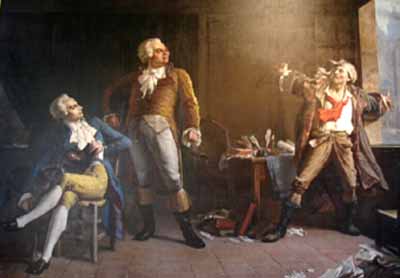
Robespierre, Danton and Marat: great men for Belloc... |
“The men of the time [the French revolutionaries] loved their country ardently, and believed with the firmness of a large and generous faith in those principles upon which all our civilization is at present based. France and the Republic were, in their minds, one thing, and a thing which they spared no means to make survive the most terrible struggle into which any nation has ever dared to enter. They killed [in order] that they might be obeyed in a time which verged on anarchy, and they desired to be obeyed because, but for obedience to government, France and all her liberties would have perished. Such a motive for punishment is just, and its execution is honest.” (Danton, p. 283)
In other words, the butchery performed by the Revolution would be “just and honest” because it prevented anarchy – the anarchy that the revolutionaries themselves created by destroying the previous order and sending to the guillotine the clergy, the nobility, and all Catholics who were opposed to their ideas. So, here we see Belloc’s promotion of the false teachings of the French Revolution to the point of trying to justify the killing of any opposition. Such killing reached its high point during the Reign of Terror.
The Terror was a period of violence that lasted for 15 months soon after the onset of the French Revolution. Under Robespierre, their leader, the radical Jacobins began a time marked by arbitrary mass executions of “enemies of the Revolution.” The guillotine became their symbol.
During this period, nobles and faithful priests, who refused to compromise with the Revolution, were sought out and killed. Included in the victims of the Terror were the Catholic peasants of the Vendée and Brittany who had taken up arms to fight the Revolution. More than 40,000 people died during the Terror.
Belloc tries to legitimize this most infamous period of the French Revolution by presenting it as nothing more than an application of a fair martial law.
“Those months, which may be roughly called the months of the Terror, were, as we shall see later in this book, months of martial law; and the Terror was simply martial law in action – a method of enforcing the military defense of the country and of punishing all those who interfered with it or were supposed by the Committee [of Public Safety] to interfere with it.” (The French Revolution, p 81)
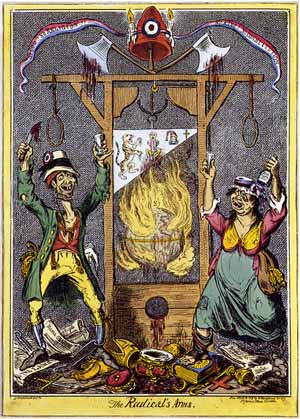
The guillotine was an instrument to destroy the Catholic Religion and traditional nobility |
Most of the victims of the Terror would have been punished, according to Belloc, because they were guilty of violating some point of the martial code:
“And most were men or women who had broken some specific part of the martial code which the Government had laid down.” (The French Revolution, p 141)
The creation of the iniquitous Committee of Public Safety which ran the Terror, was also justified by Belloc as being a necessary response to the resultant feeble government that remained:
“To return to the nature of the Government without which the French would feel they had lost their civilization, consider in what necessity the Committee of Public Safety arose. For more than six months France had been in the hands of the feeblest of governments.” (Robespierre, p 245)
“Now in April with the formation of the two engines of the Terror, the Revolutionary Tribunal and the Committee of Public Safety, this anarchy ended. The Terror was not an anarchy, … [it] was a military dictatorship.” (Robespierre, p. 246)
I offer these texts to the consideration of my reader asking whether they could be authored by a true Catholic historian or rather by a revolutionary.
‘The Vendée were rebels. I wish they had been crushed quickly’
In many of Belloc’s works, revolutionaries such as Robespierre, Saint Just, Mirabeau and Danton are repeatedly described as, “honest,” “just,” “lovers of truth,” “sincere,” “good,” “well-intentioned,” “patriotic,” etc. These praises are so numerous that it is pointless to give page numbers; anyone can find them.
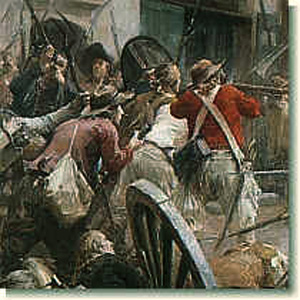
Belloc thinks little of the peasants of the Vendée who took up arms against the Revolution |
On the contrary, those who defended the Church and Christian Civilization – such as the counter-revolutionaries of the Vendée and Brittany - are referred to as “rebels.” On this point, Belloc, who presents himself as a genuine Catholic author, appears more like a man without a conscience. He displays a cold indifference, with a drop of ridicule, when it comes to the struggle of those simple people of the Vendée and Brittany who rose in arms to defend the King and restore Monarchy fighting under the banner of the Sacred Heart of Jesus.
Let me observe that even the most confessed revolutionary authors considered the smashing of that peasant insurrection by the republican army to be a great injustice and a great contradiction: The French Revolution pretended to be the voice of the people against the exploitation of the nobles, but it ended by smashing the poorest possible people, such the peasants of the Vendée and Brittany who, nonetheless, were so happy under the Monarchy that they willingly gave their lives for the King.
To counter this injustice many authors wrote famous works praising those little people. These works include Quatrevingt-Treize [1793] by Victor Hugo, Les Louves de Machecoul [The She-Wolves of Machecoul] by Alexandre Dumas and Le Chouan by Honoré de Balzac. Now, here we have Hillaire Belloc, ironically presented as a Catholic historian, who goes far beyond these revolutionary authors. Instead of defending the honor and actions of those peasants, he tries to justify the violence used against them.
He presents those heroic Vendeans as enemies of the “liberty we enjoy”:
“If one might express a longing with regard to deeds past and sins inexpiable, the longing would be that two things might have happened together: that the Revolt - Lyons, Marseilles, Toulon, Vendée, Brittany, Normandy - might have fallen suddenly (as they would have fallen before modern armies and before a modern rapidity of communication), and that the genius of Danton had not been so mixed with clay nor so mortal, and would have survived the stress of the time and been able before the Autumn to follow up the domestic victories [against the Vendée, etc.] and to organize the full force of the Republic against the invader. These things were not permitted. The extreme peril of the Revolution endured too long; August and September were full of it. The liberty we enjoy was defended as in a fortress and encircled upon every side.” (Robespierre, p 261)
The Vendeans are referred to as a “rebels” (Robespierre, p.258), not as legitimate defenders of Altar and Throne, as any true Catholic considers them. Here I present three excerpts:
• “There was news that the Vendée was not the only rebellion.” (The French Revolution, p. 133)
• “The month of April, when the Committee of Public Safety was first finding its seat in the saddle, saw the complete success of the rebels. “ (The French Revolution, p. 132)
• “A small force of regulars was to have moved from Orleans, but, before they could attack, Thouars, Parthenay, and Fontenay fell into the power of the rebels.” (The French Revolution, p. 132)
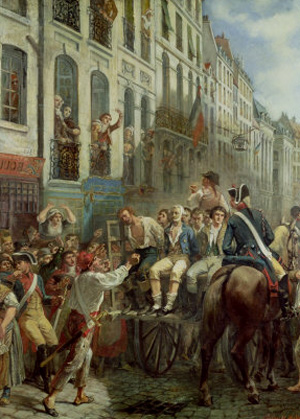
Belloc applauds the "victories of the Revolution;" above, Catholics being taken to the guillotine |
But victories of the Revolution and the “crushing of the Vendée” are exalted:
“All that Christmas was a noel of victories. It was known in one week that the Republic was saved; in one week between Christmas Eve and the New Year, Paris heard of the Vendeans crushed at Savenay, of the forcing of the lines of Wissembourg, of Landau relieved, of the enemy passing back home over the Rhine.” (Robespierre, p. 283)
The defeat of the “horde of peasantry that had taken possession of the town of Cholet,” (The French Revolution, p. 132) - which is how Belloc initially refers to the Vendeans - is seen as something good:
“A week later a kind of Sabbat led the Queen, very haggard and proud, to the guillotine, but Cholet was preparing … the great fight in which the Republic fought and fought, not noticing the hours, till at last it broke the Vendeans” (Robespierre, p. 267).
A victory of the insufficiently armed peasants against the very well-equipped republican guard is lamented and unfairly qualified as a “massacre:”
“Even as they were voting the establishment of the court [Committee of Public Safety] for treason, the Vendée had instituted a tribunal of her own, and at Machecoul had massacred the republicans” (Robespierre, p 240).
These are a few texts I selected in my reading to demonstrate how Hillaire Belloc actually is a defender of the Terror and an opponent of the Chouannérie - the insurrection of the peasants of the Vendée and Brittany - which is admired by almost all Catholics.
How can Belloc be presented as a great Catholic author, when he opposes the teachings of the Popes on the French Revolution, Rousseau and Deism, and goes so far as to justify the Terror? He should be considered rather as a revolutionary historian. At the least, he should be called a liberal, not a true Catholic.
Did Belloc pave the way for the Russian Revolution?
Was he only a liberal? Trying to answer this question, let me go a little further in my investigation.
The French Revolution was primarily a political-social landmark. Its purpose was to establish equality in society just as some time earlier the Protestant Revolution had imposed equality in religion, and sometime later the Russian Revolution would impose equality in economy. This general leveling, which is contrary to nature and in its final consequences is also contrary to God, frequently resorts to violence. Such violence paradoxically boasts of being a fight for liberty, but actually it destroys true liberty, since true liberty allows each of us the freedom to choose the ways of accomplishing God’s plan for us. Therefore, true liberty supports natural inequalities.
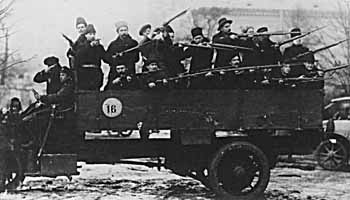
Above, the Communist Guard in St. Petersburg, 1918; below, skulls of the victims of the Communists in Cambodia, 1975
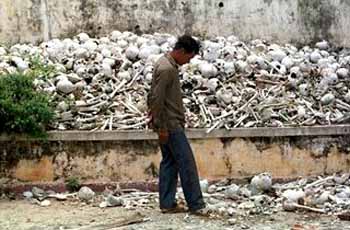
|
Now then, this frequent praise of the French Revolution and the egalitarianism it promoted, as well as the violence of the Terror, was made by Belloc in books written just prior to the Russian Revolution of 1917. (2) I ask: Wouldn’t these works help prepare the ideas and the environment for the victory of Communism?
This is not a rhetorical question. Any historian worth his salt knows that the principles of the French Revolution led to the Russian Revolution. In the introduction to the classic work The French Revolution, by Pierre Gaxotte, Prof. Walter Alison Phillips states:
“Mr. Gaxotte holds that Communism is the logical outcome of the principles of the [French] Revolution, and in this he is at one with the Communists themselves, who regard Robespierre as one of the chief apostles of their creed. Not the least valuable part of his book is the account given of the communistic experiments conducted under the Terror and their results. The Terror itself, he rightly maintains, was not - as is commonly pretended [and as Belloc pretends, I add] - necessitated by the perils of the country; indeed, it reached its height after the victories of the French arms had removed all danger of invasion. It was deliberately maintained, and intensified, by Robespierre and his lieutenants as the necessary means to their end, which was the social revolution. ‘That which constitutes a republic,’ said Saint-Just in the Convention,’ is the destruction of all that is opposed to it.’
“This is the principle on which the Bolsheviks have acted in the Russian Revolution, using the Machiavellian method of ‘cruelty well applied’ with an even greater ruthlessness than that shown by the French terrorists. They justify this system, which is the very negation of liberty, by the same reasoning as that which guided, or misguided, Robespierre and his like.” (Prof. Walter Alison Phillips’ Introduction to Pierre Gaxotte’s The French Revolution, p. xiii)
Final doubt…
At this point of my analysis, I am a little uncertain as to whether I should keep the title of this series as Hillaire Belloc: the Liberal, or change it to Hillaire Belloc: the Socialist, or perhaps even to Hillaire Belloc: the pre-Communist.
I believe I will keep it as it is. But it is good for my readers to keep in mind the full extent of the meaning of the word "liberal" and its ultimate consequences.
Continued
1. Danton: A Study by Hilaire Belloc, New York: Charles Scribner’s Sons, 1899, 440 pp.;
• Robespierre: A Study, by Hilaire Belloc, New York: Charles Scribner’s Sons, 1901, 387 pp.;
• The French Revolution, by Hilaire Belloc, New York: Henry Holt and Company - London: Williams and Norgate, 1911, 254 pp.;
• The Last Days of the French Monarchy, by Hilaire Belloc, London: Chapman & Hall Ltd., 1916, 216 pp.
2. At age 29 he wrote Danton: A Study (1899); at age 31, Robespierre: A Study (1901); at age 41, The French Revolution (1911); and at age 46, The Last Days of the French Monarchy (1916).

Posted October 13, 2008

Related Articles of Interest:
 Belloc the Liberal I - His Support of the French Revolution Belloc the Liberal I - His Support of the French Revolution
 Belloc the Liberal II - His Enthusiasm for Rousseau Belloc the Liberal II - His Enthusiasm for Rousseau
 The Suffering of Father Bardeau The Suffering of Father Bardeau
 Pope Bows to the Ideals of the French Revolution Pope Bows to the Ideals of the French Revolution
 Unmasking the Myth of Queen Marie Antoinette Unmasking the Myth of Queen Marie Antoinette
 The State of Mind that Generated the Revolution The State of Mind that Generated the Revolution
 Revolution and Counter-Revolution: Historic Overview Revolution and Counter-Revolution: Historic Overview

|
Social-Political | Hot Topics | Home | Books | CDs | Search | Contact Us | Donate

© 2002- Tradition in Action, Inc. All Rights
Reserved
|
 |
|